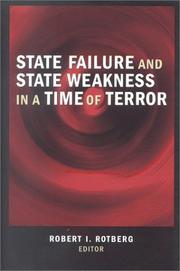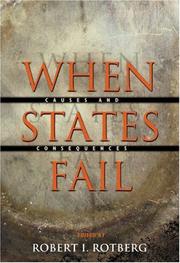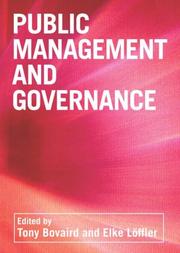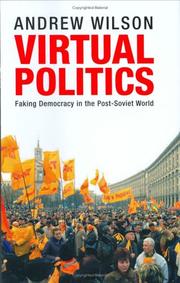| Listing 1 - 6 of 6 |
Sort by
|

ISBN: 0815775741 0815775733 Year: 2003 Publisher: Cambridge Harvard University Press
Abstract | Keywords | Export | Availability | Bookmark
 Loading...
Loading...Choose an application
- Reference Manager
- EndNote
- RefWorks (Direct export to RefWorks)
International movements --- Government --- Developing countries --- 327.3 --- Ontwikkelingslanden --- Internationale bewegingen --- POLITICAL SCIENCE --- Security (National & International) --- Legitimacy of governments --- Political stability --- World politics --- Failed states --- Political Institutions & Public Administration - General --- Government - General --- Law, Politics & Government --- Failed states. --- Politics and government. --- Destabilization (Political science) --- Political instability --- Stability, Political --- Consensus (Social sciences) --- Governments, Legitimacy of --- Legitimacy (Constitutional law) --- Revolutions --- Sovereignty --- State, The --- General will --- Regime change --- State failure --- Political science

ISBN: 0691116725 0691116717 9786612665837 1400835798 1282665839 9780691116716 9780691116723 Year: 2010 Publisher: Princeton, NJ : Princeton University Press,
Abstract | Keywords | Export | Availability | Bookmark
 Loading...
Loading...Choose an application
- Reference Manager
- EndNote
- RefWorks (Direct export to RefWorks)
Since 1990, more than 10 million people have been killed in the civil wars of failed states, and hundreds of millions more have been deprived of fundamental rights. The threat of terrorism has only heightened the problem posed by failed states. When States Fail is the first book to examine how and why states decay and what, if anything, can be done to prevent them from collapsing. It defines and categorizes strong, weak, failing, and collapsed nation-states according to political, social, and economic criteria. And it offers a comprehensive recipe for their reconstruction. The book comprises fourteen essays by leading scholars and practitioners who help structure this disparate field of research, provide useful empirical descriptions, and offer policy recommendations. Robert Rotberg's substantial opening chapter sets out a theory and taxonomy of state failure. It is followed by two sets of chapters, the first on the nature and correlates of failure, the second on methods of preventing state failure and reconstructing those states that do fail. Economic jump-starting, legal refurbishing, elections, the demobilizing of ex-combatants, and civil society are among the many topics discussed. All of the essays are previously unpublished. In addition to Rotberg, the contributors include David Carment, Christopher Clapham, Nat J. Colletta, Jeffrey Herbst, Nelson Kasfir, Michael T. Klare, Markus Kostner, Terrence Lyons, Jens Meierhenrich, Daniel N. Posner, Susan Rose-Ackerman, Donald R. Snodgrass, Nicolas van de Walle, Jennifer A. Widner, and Ingo Wiederhofer.
Failed states. --- GeografieSociale geografie --- Private law --- International relations. Foreign policy --- Political philosophy. Social philosophy --- Political systems --- Legitimacy of governments --- World politics --- Failed states --- Developing countries --- Politics and government --- Geografie --- Sociale geografie --- Politieke Geografie. --- Politics and government. --- State failure --- Political science --- Governments, Legitimacy of --- Legitimacy (Constitutional law) --- Consensus (Social sciences) --- Revolutions --- Sovereignty --- State, The --- General will --- Political stability --- Regime change --- Legitimacy of governments - Developing countries --- World politics - 1989 --- -Failed states --- Developing countries - Politics and government

ISBN: 9780415430425 9780415430432 9780203884096 0415430429 0415430437 0203884094 1134527837 1134527845 0203638581 1280102292 0203634217 9780203634219 0415252458 9780415252454 9780415252461 0415252466 0415252466 9781134527830 9781134527847 9780203638583 9781280102295 Year: 2003 Publisher: London Routledge
Abstract | Keywords | Export | Availability | Bookmark
 Loading...
Loading...Choose an application
- Reference Manager
- EndNote
- RefWorks (Direct export to RefWorks)
First published in 2003. Routledge is an imprint of Taylor & Francis, an informa company.
Public administration --- Organization theory --- Political sociology --- #SBIB:35H200 --- Overheidsmanagement: algemene werken --- Government productivity. --- Legitimacy of governments. --- Public administration. --- Citizen participation. --- #SBIB:35H200Overheidsmanagement: algemene werken --- Government productivity --- Legitimacy of governments --- Administration, Public --- Delivery of government services --- Government services, Delivery of --- Public management --- Public sector management --- Political science --- Administrative law --- Decentralization in government --- Local government --- Public officers --- Governments, Legitimacy of --- Legitimacy (Constitutional law) --- Consensus (Social sciences) --- Revolutions --- Sovereignty --- State, The --- General will --- Political stability --- Regime change --- Productivity, Government --- Capital productivity --- Production (Economic theory) --- Citizen participation --- #SBIB:033.IO --- Public administration - Citizen participation. --- Overheidsmanagement.

Abstract | Keywords | Export | Availability | Bookmark
 Loading...
Loading...Choose an application
- Reference Manager
- EndNote
- RefWorks (Direct export to RefWorks)
Politics, Practical --- Legitimacy of governments --- Mass media --- Institutions politiques --- Légitimité des gouvernements --- Médias --- Political aspects --- Aspect politique --- Former Soviet republics --- Ex-URSS --- Politics and government. --- Politique et gouvernement --- Politics and government --- Politics, PracticalPolitical aspects --- #SBIB:328H262 --- #SBIB:328H263 --- Instellingen en beleid: Rusland en het GOS --- Instellingen en beleid: andere GOS-staten --- Légitimité des gouvernements --- Médias --- Electoral politics --- Mass political behavior --- Political behavior --- Politics --- Practical politics --- Political science --- Political participation --- Mass communication --- Media, Mass --- Media, The --- Communication --- Governments, Legitimacy of --- Legitimacy (Constitutional law) --- Consensus (Social sciences) --- Revolutions --- Sovereignty --- State, The --- General will --- Political stability --- Regime change --- Politics [Practical ] --- Politics, Practical - Former Soviet republics --- Legitimacy of governments - Former Soviet republics --- Mass media - Political aspects - Former Soviet republics --- Former Soviet republics - Politics and government
Book
ISBN: 9781107029330 1107029333 9781139248952 9781107542686 1107542685 1107301742 1107237262 1107305853 1107314585 1139248952 1107309034 1107306833 1107312388 129939907X 9781107314580 9781107306837 9781107237261 9781107301740 9781107305854 9781107312388 9781107309036 Year: 2013 Publisher: Cambridge : Cambridge University Press,
Abstract | Keywords | Export | Availability | Bookmark
 Loading...
Loading...Choose an application
- Reference Manager
- EndNote
- RefWorks (Direct export to RefWorks)
The concepts of statehood and self-determination provide the normative structure on which the international legal order is ultimately premised. As a system of law founded upon the issue of territorial control, ascertaining and determining which entities are entitled to the privileges of statehood continues to be one of the most difficult and complex issues. Moreover, although the process of decolonisation is almost complete, the principle of self-determination has raised new challenges for the metropolitan territories of established states, including the extent to which 'internal' self-determination guarantees additional rights for minority and other groups. As the controversies surrounding remedial secession have revealed, the territorial integrity of a state can be questioned if there are serious and persistent breaches of a people's human rights. This volume brings together such debates to reflect further on the current state of international law regarding these fundamental issues.
Self-determination, National --- Recognition (International law) --- Sovereignty --- Legitimacy of governments --- Newly independent states --- Self-determination, National. --- Sovereignty. --- Legitimacy of governments. --- Newly independent states. --- Recognition (International law). --- Droit des peuples à disposer d'eux-mêmes --- Reconnaissance (Droit international) --- Souveraineté --- Légitimité des gouvernements --- Nouveaux Etats indépendants --- Droit des peuples à disposer d'eux-mêmes --- Souveraineté --- Légitimité des gouvernements --- Nouveaux Etats indépendants --- Law --- General and Others --- Countries, Newly independent --- Nations, Newly independent --- Nations, Young --- New countries --- New nations --- New states --- States, New --- States, Newly independent --- States, Young --- Young nations --- Young states --- Political science --- New democracies --- Governments, Legitimacy of --- Legitimacy (Constitutional law) --- Consensus (Social sciences) --- Revolutions --- State, The --- General will --- Political stability --- Regime change --- State sovereignty (International relations) --- International law --- Common heritage of mankind (International law) --- International relations --- De facto doctrine (International law) --- De facto government --- Estrada doctrine --- Nonrecognition of governments --- De facto doctrine --- State succession --- National self-determination --- Nationalism --- Nation-state --- Nationalities, Principle of --- Law and legislation

ISBN: 9780691128665 0691128669 0691138346 9786612157608 1282157604 1400827744 9781400827749 9780691138343 9780691138343 Year: 2007 Publisher: Princeton, N.J. Princeton University Press
Abstract | Keywords | Export | Availability | Bookmark
 Loading...
Loading...Choose an application
- Reference Manager
- EndNote
- RefWorks (Direct export to RefWorks)
The politics of legitimacy is central to international relations. When states perceive an international organization as legitimate, they defer to it, associate themselves with it, and invoke its symbols. Examining the United Nations Security Council, Ian Hurd demonstrates how legitimacy is created, used, and contested in international relations. The Council's authority depends on its legitimacy, and therefore its legitimation and delegitimation are of the highest importance to states. Through an examination of the politics of the Security Council, including the Iraq invasion and the negotiating history of the United Nations Charter, Hurd shows that when states use the Council's legitimacy for their own purposes, they reaffirm its stature and find themselves contributing to its authority. Case studies of the Libyan sanctions, peacekeeping efforts, and the symbolic politics of the Council demonstrate how the legitimacy of the Council shapes world politics and how legitimated authority can be transferred from states to international organizations. With authority shared between states and other institutions, the interstate system is not a realm of anarchy. Sovereignty is distributed among institutions that have power because they are perceived as legitimate. This book's innovative approach to international organizations and international relations theory lends new insight into interactions between sovereign states and the United Nations, and between legitimacy and the exercise of power in international relations.
Legitimacy of governments --- Légitimité des gouvernements --- United Nations --- Security Council --- Resolutions --- Resolutions. --- Hội đồng bảo an Liên Hợp Quốc --- Regime changeResolutions.United Nations. --- Legitimacy of governments. --- Governments, Legitimacy of --- Legitimacy (Constitutional law) --- Consensus (Social sciences) --- Revolutions --- Sovereignty --- State, The --- General will --- Political stability --- Regime change --- United Nations. --- UN --- UNO --- 255.1 Verenigde Naties --- 822.1 Verenigde Naties --- Naciones Unidas --- Nations Unies --- ONU --- Organisation des Nations Unies --- Organizat︠s︡ii︠a︡ Obʺedinennykh Nat︠s︡iĭ --- OON --- Vereinigte Nationen --- Umot ha-meʼuḥadot --- Organizacja Narodów Zjednoczonych --- ONZ --- Forente nasjoner --- Forenede nationer --- FN --- Förenta nationerna --- Gaertʻianebuli erebi --- Organização das Nações Unidas --- PBB --- Perserikatan Bangsa-Bangsa --- Kokusai Rengō --- Kokuren --- ENSZ --- Egyesült Nemzetek Szövetsége --- Birleșmiș Milletler Teșkilâtı --- Birlăşmiş Millătăr Tăşkilatı --- Birlashgan Millatlar Tashkiloti --- BMT --- YK --- Yhdistyneet kansakunnat --- OUN --- Organizacija Ujedinjenih Nacija --- NU --- Nazioni Unite --- OSN --- Organizace spojených národů --- Sāzmān-i Milal-i Muttafiq --- Bangsa² Bersatu --- Organización de las Naciones Unidas --- Ühinenud Rahvaste Organisatsioon --- ÜRO --- Organismos tōn Hēnōmenōn Ethnōn --- Umoja wa Mataifa --- Vereinten Nationen --- Vereinte Nationen --- Hayʼat al-Umam al-Muttaḥidah --- Verenigde Naties --- VN --- Organizația Națiunilor Unite --- Um --- Lien ho kuo --- OKB --- Organizata e Kombeve të Bashkuara --- Lian he guo --- U.N. --- Umam al-Muttaḥidah --- OĒE --- Hēnōmena Ethnē --- Organizácia Spojených Národov --- Sahaprachāchāt --- Națiunile Unite --- Organizat︠s︡ii︠a︡ na obedinenite nat︠s︡ii --- Organismos Hēnōmenōn Ethnōn --- Manẓūmat al-Umam al-Muttaḥidah --- AAN --- Arhanizatsyi︠a︡ Ab'i︠a︡dnanykh Natsyĭ --- Nações Unidas --- Orhanizat︠s︡ii︠a︡ Ob'i︠e︡dnanykh Nat︠s︡iĭ --- O.Ē.E. --- ʻOngkān Sahaprachāchāt --- Sjuninejal Konob'laq --- Sāzmān-i Milal-i Muttaḥid --- Milal-i Muttaḥid --- Nėgdsėn U̇ndėstniĭ Baĭguullaga --- NUB --- Rāshṭrasaṃgha --- או״מ --- أمم المتحدة --- الأمم المتحدة --- سازمان ملل متحد --- 国際連合 --- 联合囯 --- 聯合國 --- United Nations Organization --- Liên Hiệp Quó̂c --- Liên Hợp Quó̂c --- LHQ --- Kula Samagga --- YūʼAṅʻnʻ --- 联合国 --- Организация на обединените нации --- Организация Объединённых Наций --- United Nation.
| Listing 1 - 6 of 6 |
Sort by
|

 Search
Search Feedback
Feedback About
About Help
Help News
News